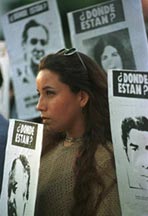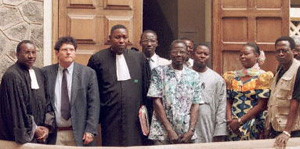|
Interviews
by Marguerite Feitlowitz
The
Italian arrest of Jorge Olivera, a retired Argentine army major,
soon became a bizarre legal theatrical. Detained in Rome on August
6 on a French extradition request for the torture and forced disappearance
of a French citizen in Argentina in 1976, Olivera was released on
September 18 on the basis of a highly suspicious document, soon
found to be have been faked by Olivera and his associates. In order
to circumvent the fact that cases of forced disappearance have no
statute of limitation in international human rights law, Olivera
(who is also a lawyer) presented a supposed death certificate for
Marie Anne Erize, the French woman he is accused of kidnapping and
torturing, and whose body has never been found. By the time the
document was proven to be false, Olivera had been flown back to
Argentina, where he has legal immunity for atrocities committed
during the dictatorship. In Italy, the two judges who released him
are under investigation. In the Buenos Aires suburb where he lives,
Olivera was officially declared Persona Non Grata; human rights
and citizens groups have spray-painted Asesino! Torturador! on the
front of his house. Human rights groups are studying ways to bring
this miscarriage of justice to an international tribunal.
How best to confront such dynamism has become a heated legal, moral,
and political issue. The experts consulted for this article disagree,
sometimes starkly, on optics, emphases, and preferred courses of
action.
Only when asked to compile a working list of former heads of state
vulnerable to international arrest in the wake of the Pinochet precedent,
did our experts widely concur. For most of the respondents, the
magnitude and scale of atrocities were decisive factors in their
selections:
 |
| IDI
AMIN IN 1979 LIAISION |
|
Idi
Amin [de facto president of
Uganda, 1971-1979], for the scale of his general brutality,
purging of the Lango and Acholi tribes, and expulsion of the
country's entire Asian population. It is believed that over
300,000 perished in his bloody reign of terror. He is living
under official protection in Saudi Arabia. When Human Rights
inquired of a Saudi ambassador about the possibility of extraditing
him for prosecution, he was told that such an action would violate
"Bedouin hospitality." |
 |
| MILTON
OBOTE |
|
Milton
Obote, president of Uganda
(1980-85), for continued brutality and repression on a scale
that some believe to exceed that of Idi Amin. He lives in Zambia. |
|
|
|
| A
demonstration to support the arrest of former dictator
Gen. Augusto Pinochet in Santiago, Chile, The signs in
photo show pictures of the missing with the caption "Where
Are They?" AP Photo/Dario Lopez-Mills |
|
|
|
| Witnesses
and lawyers in the case of former Chadian President Hissene
Habre, stand 31 January 2000 in front of the courthouse
in Dakar. |
|
|




